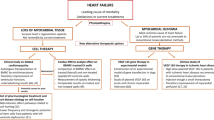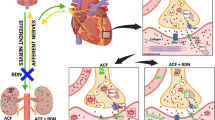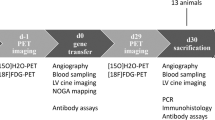Abstract
Gene transfer to modify donor heart function during transplantation has significant therapeutic implications. Recent studies by our laboratory in transgenic mice have shown that overexpression of β2-adrenergic receptors (β2-ARs) leads to significantly enhanced cardiac function. Thus, we investigated the functional consequences of adenovirus-mediated gene transfer of the human β2-AR in a rat heterotopic heart transplant model. Donor hearts received 1 ml of solution containing 1 × 1010 p.f.u. of adenovirus encoding the β2-AR or an empty adenovirus as a control. Five days after transplantation, basal left ventricular (LV) pressure was measured using an isolated, isovolumic heart perfusion apparatus. A subset of hearts was stimulated with the β2-AR agonist, zinterol. Treatment with the β2-AR virus resulted in global myocardial gene transfer with a six-fold increase in mean β-AR density which corresponded to a significant increase in basal contractility (LV + dP/dtmax, control: 3152.1 ± 286 versus β2-AR, 6250.6* ± 432.5 mmHg/s; n = 10, *P < 0.02). β2-AR overexpressing hearts also had higher contractility after zinterol administration compared with control hearts. Our results indicate that myocardial function of the transplanted heart can be enhanced by the adenovirus-mediated delivery of β2-ARs. Thus, genetic manipulation may offer a novel therapeutic strategy to improve donor heart function in the post- operative setting.
This is a preview of subscription content, access via your institution
Access options
Subscribe to this journal
Receive 12 print issues and online access
$259.00 per year
only $21.58 per issue
Buy this article
- Purchase on Springer Link
- Instant access to full article PDF
Prices may be subject to local taxes which are calculated during checkout




Similar content being viewed by others
References
Williams RS . Boosting cardiac contractility with genes New Engl J Med 1995 332: 817–818
Torre-Amione G, Kapadia S, Short III D, Young JB . Evolving concepts regarding selection of patients for cardiac transplantation: assessing risks and benefits Chest 1996 109: 223–232
D’Amico T et al. Desensitization of myocardial beta-adrenergic receptors and deterioration of left ventricular function after brain death J Thorac Cardiovasc Surg 1995 110: 746–751
Chester MR, Amadi AA, Barnett DB . β-Adrenoreceptor density in the donor heart: a guide to prognosis? Br Heart J 1995 73: 540–543
Schwinn DA et al. Desensitization of myocardial beta-adrenergic receptors during cardiopulmonary bypass. Evidence for early uncoupling and late downregulation Circulation 1991 84: 2559–2567
Dalesandro J et al. Gene therapy for donor hearts: ex vivo liposome-mediated transfection J Thorac Cardiovasc Surg 1996 111: 416–421
Lee J et al. Cardiac gene transfer by intracoronary infusion of adenovirus vector-mediated reporter gene in the transplanted mouse heart J Thorac Cardiovasc Surg 1996 111: 246–252
Wang J, Ma Y, Knechtle SJ . Adenovirus-mediated gene transfer into rat cardiac allografts Transplantation 1996 61: 1726–1729
Sawa Y et al. Efficiency of in vivo gene transfection into transplanted rat heart by coronary infusion of HVJ liposome Circulation 1995 92 (Suppl. II): 479–482
Kypson AP et al. Ex vivo adenoviral-mediated gene transfer to the transplanted adult rat heart J Thorac Cardiovasc Surg 1998 115: 623–630
Milano CA et al. Enhanced myocardial function in transgenic mice overexpressing the β2-adrenergic receptor Science 1994 264: 582–586
Drazner MH et al. Potentiation of beta-adrenergic signaling by adenoviral-mediated gene transfer in adult rabbit ventricular myocytes J Clin Invest 1997 99: 288–296
Yang Y et al. Cellular immunity to viral antigens limits E1-deleted adenoviruses for gene therapy Proc Natl Acad Sci USA 1994 91: 4407–4411
Brauner R et al. Intracoronary gene transfer of immunosuppressive cytokines to cardiac allografts: method and efficacy of adenovirus-mediated transduction J Thorac Cardiovasc Surg 1997 113: 1059–1067
Qin L, Ding Y, Blomberg JS . Gene transfer of transforming growth factor-β1 prolongs murine cardiac allograft survival by inhibiting cell-mediated immunity Hum Gene Ther 1996 7: 1981–1988
Acsadi G et al. Direct gene transfer and expression into rat heart in vivo New Biol 1991 3: 71–81
Lin H et al. Expression of recombinant genes in myocardium in vivo after direct injection of DNA Circulation 1990 82: 2217–2221
Barr E et al. Efficient catheter-mediated gene transfer into the heart using replication-defective adenovirus Gene Therapy 1994 1: 51–58
Giordano FJ et al. Intracoronary gene transfer of fibroblast growth factor-5 increases blood flow and contractile function in an ischemic region of the heart Nature Med 1996 2: 519–520
Brodde OE . Beta-adrenoceptors in cardiac disease Pharmac Ther 1993 60: 405–430
Akhter SA et al. Restoration of β-adrenergic signaling in failing cardiac ventricular myocytes via adenovirus-mediated gene transfer Proc Natl Acad Sci USA 1997 94: 12100–12105
Turki J et al. Myocardial signaling defects and impaired cardiac contractility conferred by a human β2-adrenergic receptor polymorphism expressed in transgenic mice Proc Natl Acad Sci USA 1996 93: 10483–10488
Maurice JP et al. Global myocardial overexpression of β2-adrenergic receptors via intracoronary adenovirus delivery enhances in vivo contractility Circulation 1998 98: 737 (Abstr.)
Ensley RD et al. Effects of alloimmune injury on contraction and relaxation in cultured myocytes and intact cardiac allografts J Am Coll Cardiol 1994 24: 1769–1778
DiSesa VJ et al. The mechanism of heart failure caused by cardiac allograft rejection J Thorac Cardiovasc Surg 1991 101: 446–449
Pyo RT, Wahler GM . Ventricular myocytes isolated from rejecting cardiac allografts exhibit reduced beta-adrenergic contractile response J Mol Cell Cardiol 1995 27: 773–776
Hanna AK et al. Molecular mechanism of contractile dysfunction in cardiac allograft rejection J Surg Res 1992 52: 472–475
Dupuis JY et al. Beta-adrenergic signal transduction and contractility in the canine heart after cardiopulmonary bypass Cardiovasc Res 1997 36: 223–235
Peppel K, Koch WJ, Lefkowitz RJ . Gene transfer strategies for augmenting cardiac function Trends Cardiovasc Med 1997 7: 145–150
Hehir KM et al. Molecular characterization of replication-competent variants of adenovirus vectors and genome modifications to prevent their occurrence J Virol 1996 70: 8459–8467
Ono K, Lindsey ES . Improved technique of heart transplantation in rats J Thorac Cardiovasc Surg 1969 57: 225–229
von Zastrow M, Kobilka BK . Ligand-regulated internalization and recycling of human beta2-adrenergic receptors between the plasma membrane and endosomes containing transferrin receptors J Biol Chem 1992 267: 3530–3538
Langendorff O . Untersuchungen am uberlebenden Saugethierherzen Arch Ges Physiol (Pfluger) 1895 61: 291–332
Acknowledgements
The authors wish to thank K Shotwell for assistance with biochemical assays and K Peppel for helpful discussions during the early phases of this study. We also thank the Genzyme Corporation (Framingham, MA, USA) for preparation and purification of some of the Adeno-β2AR used in this study. This work was supported in part by NIH grants HL-16037 (RJL), HL-59533 (WJK) and HL-56205 (WJK).
Author information
Authors and Affiliations
Rights and permissions
About this article
Cite this article
Kypson, A., Hendrickson, S., Akhter, S. et al. Adenovirus-mediated gene transfer of the β2-adrenergic receptor to donor hearts enhances cardiac function. Gene Ther 6, 1298–1304 (1999). https://doi.org/10.1038/sj.gt.3300940
Received:
Accepted:
Published:
Issue Date:
DOI: https://doi.org/10.1038/sj.gt.3300940
Keywords
This article is cited by
-
βARKct: A Therapeutic Approach for Improved Adrenergic Signaling and Function in Heart Disease
Journal of Cardiovascular Translational Research (2010)
-
A minimally invasive approach for efficient gene delivery to rodent hearts
Gene Therapy (2004)
-
New molecular insights into heart failure and cardiomyopathy: potential strategies and therapies
Irish Journal of Medical Science (2002)
-
Myocardial gene transfer
Current Cardiology Reports (2001)
-
Direct intra-cardiomuscular transfer of β2-adrenergic receptor gene augments cardiac output in cardiomyopathic hamsters
Gene Therapy (2000)



